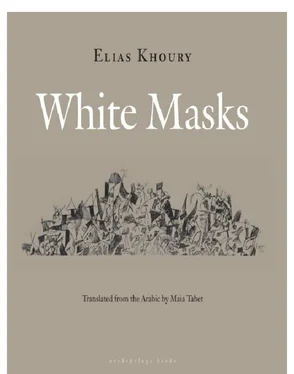Assem was waiting for us at the front door, gun in hand. He wanted to know what had taken us so long, and then, seeing Sameer’s blood-spattered clothes, he asked us what had happened.
“We killed her,” I answered.
“Did you find anything?”
“Sameer has the jewelry.”
Then we went to my house and Sameer took off his clothes and showered. He said he felt nauseous, that the smell was killing him, and he needed a 7-Up. When we went out in the morning, he got his 7-Up, and we all had some foul. But he refused to give us the bracelet. Then I told the pharmacist — not on account of the bracelet, it wasn’t worth the trouble — but I told the bastard for laughs, how Sameer had screwed a woman his grandmother’s age, and he went and squealed! He claims it’s because the doctor was his friend and he felt sorry for him. That’s what he says, but I’m sure it’s just because he used to get a cut on the prescriptions the doctor wrote… the medication mafia. . you know what I mean. And because we don’t have connections in high places, nobody’s got our back — actually everyone turned their back on us — and we’re not regarded as “part of the bedrock of society”. . meaning that we’re expected to do the shit work while they reap the benefits. . that’s why we’re being investigated. . well, I have my pride, and I’m not willing to be someone else’s fetch dog!
The magistrate was astounded as he watched them reenacting the crime with the utmost matter-of-factness; they showed him how they carried the two corpses out of the apartment, took them down in the elevator, dumped them in the empty caretaker’s quarters, and then locked the door behind them and pocketed the key.
Such a heinous crime — it makes you shudder just thinking about it. . And Khalil, poor man, he hadn’t done anything… I told you I used to see him out and about — he was completely harmless, just an ordinary man. Only now do I understand what was ailing him. . it was his nerves. . all these wars had shattered his nerves. . honestly, we’re all at the end of our ropes. So what if he stood on the sidewalk in his suit and tie as if he’d lost something? Why kill him?. .
Dr. Khatchadourian’s son, a young man in his thirties, was finishing medical school in America. He was at Georgetown University, in Washington, DC, when he had to come back for his parents’ funeral. He told anyone willing to listen that he couldn’t understand how a nineteen-year-old was capable of raping a sixty-five-year-old woman.
Poor Father, the bane of his existence was that he could never quench his thirst! There was never enough water as far as he was concerned. He’d drink and drink and was always afraid of water shortages and the dark. He’d collect all the bottles and put them by the side of his bed, as if the water might run away. Whenever I came back to Beirut on short visits, he’d talk about how the water was contaminated and how you had to boil and filter it thoroughly because it was full of germs. I used to tell him he should drink the mineral water you could get in plastic bottles, but he wouldn’t: he said those bottles were tampered with, that the water wasn’t pure, and that it was probably even more polluted and dangerous than tap water.
I felt sorry for him in his old age because of the way he used to forget things. He’d fill one bottle and then, forgetting the first one, he’d fill another. My mother barely looked after him anymore. She gave the impression that she couldn’t stand him and was always making fun of the way he urinated, standing in the bathroom for hours with the water running. My advice to him was that he shouldn’t drink so much water. Where was it to go after all? I told him if you need to drink that much water, why don’t you go ahead and have the prostate operation? But he’d just get angry and go and sit alone in a corner of the living room, refusing to speak to me.
I don’t know what happened to my mother… She wasn’t looking after the house anymore, or cooking the delicious, spicy food that I miss every single day in America. No vegetables, no meat, and no eggs for her: the days of eating are over, she’d say. She had taken to drinking vast quantities of milk — and Father did the same. The house stank of milk, but whenever I tried to suggest that they should have something besides that, my mother wouldn’t hear of it.
“I like milk, my son. And your father, he too can drink milk. It’s better than water.”
Milk was everywhere: the milk in glass bottles, and the powdered kind, in cans. The kitchen floor was littered with empty cans mother wouldn’t throw away. “I never throw anything away,” she’d say.
Now they’re dead, and there’s no longer any reason for me to come back to Beirut. I’m just going to leave — the house, the furniture, everything. Let them have it, all of it, I don’t want a thing. I used to beg them to come with me to America, but they never would. You’d think Beirut was Armenia! I told Father that he was entitled to leave without feeling guilty. Leaving Beirut isn’t an act of treason, I’d tell him, but he’d say, “What about our home? People shouldn’t abandon their homes!”
I think I’d like to meet their killers. . Well, maybe not. . I wonder why they did that to my mother… No, no, I’m leaving and I don’t want to see anybody. . They all despise me anyway: I saw how they behaved at the funeral, sniggering and grimacing, and then sitting in our house drinking coffee and smoking cigarettes, making conversation and laughing! You’d think we were having a party they were having such a good time! A funeral a party! No, no, I don’t want to see anybody, I just want to leave.
Ali Kalakesh recalls:
I remember the first time I met him. I don’t recall the exact day, but I was on my way home one evening, slightly breathless from the load of fruit and vegetables I was carrying, when I saw this man standing on the sidewalk across the street from our building. He greeted me, or I thought he did. . In any case, he nodded and muttered something; dressed in a well-cut suit, he looked as if he might be waiting for someone, but he had this bewildered air about him — unshaven, a vacant look about the eyes, a mouth that seemed to be quivering. Come to think of it, I don’t think he said anything to me, it was just his mouth quivering.
Climbing up the stairs to the apartment, I didn’t give him another thought — there wasn’t anything to think about. I went in, washed my face, and, as was my habit, slumped down in front of the TV with a glass of whiskey and started telling my wife about my day. At about ten o’clock that evening I heard gunfire on the street, so I went out to the balcony to see what was happening, and there he was again, facing the wall with his back to the street, his hands moving up and down as if he were plastering something onto the wall, or taking something down. I couldn’t quite make out what he was up to. I remember being puzzled and thinking to myself that it was strange. But I went back inside and thought no more of it-Ididn’t even bother telling my wife about him, I just went to bed and fell asleep.
Things began to get complicated, at least from my point of view, when my friend Musa Kanj came to visit. We go back a long way, Musa and I. I first met him when he came to our office seeking help with the interior decoration of his apartment. I went to see the place and met his wife, Nadia. She was a pretty brunette with long hair, who seemed twenty years younger than him; she was the one who discussed all the details of the work with me. At my suggestion, they bought some fairly expensive furniture, for which Musa paid quite happily- he had his heart set on pleasing his wife in whatever way possible — and the work was completed in short order. Nadia was a divorcée, and it surprised me that a man of Musa’s wealth who owned a fabric store in Souq Taweeleh would marry a divorced woman with two children. But, I guess those are love’s hidden ways and love overcomes all things. . Then we all became friends. One day my wife went to Musa’s store to buy some fabric, and he wouldn’t take any payment from her. We exchanged visits, and the two women grew close; over time our relationship deepened and grew stronger.
Читать дальше












